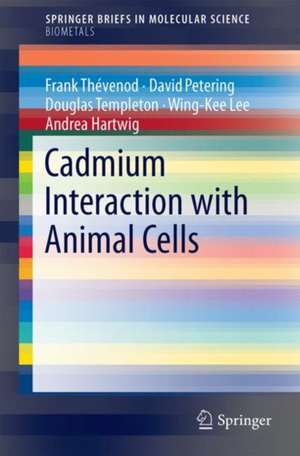Cadmium Interaction with Animal Cells
Editat de Frank Thévenod, David Petering, Douglas M. Templeton, Wing-Kee Lee, Andrea Hartwigen Limba Engleză Hardback – 11 ian 2019
Preț: 942.94 lei
Preț vechi: 1149.93 lei
-18% Nou
Puncte Express: 1414
Preț estimativ în valută:
180.49€ • 196.12$ • 151.71£
180.49€ • 196.12$ • 151.71£
Carte tipărită la comandă
Livrare economică 21 aprilie-05 mai
Preluare comenzi: 021 569.72.76
Specificații
ISBN-13: 9783319896229
ISBN-10: 3319896229
Pagini: 215
Ilustrații: IX, 125 p. 13 illus., 9 illus. in color.
Dimensiuni: 155 x 235 mm
Greutate: 0.37 kg
Ediția:1st ed. 2018
Editura: Springer International Publishing
Colecția Springer
Locul publicării:Cham, Switzerland
ISBN-10: 3319896229
Pagini: 215
Ilustrații: IX, 125 p. 13 illus., 9 illus. in color.
Dimensiuni: 155 x 235 mm
Greutate: 0.37 kg
Ediția:1st ed. 2018
Editura: Springer International Publishing
Colecția Springer
Locul publicării:Cham, Switzerland
Cuprins
Membrane Transport Proteins and Receptors for Cadmium and Cadmium Complexes.- The Chemical Biology of Cadmium.- Interactions of Cadmium With Signaling Molecules.- Cell Organelles as Targets of Cadmium Toxicity.- Cadmium and its Impact on Genomic Stability.
Notă biografică
Frank Thévenod received his MD from Goethe University, Frankfurt, Germany, and his PhD in cellular physiology and biophysics from Case Western Reserve University (CWRU), Cleveland, USA. Since 2002 he holds the Chair of Physiology, Pathophysiology and Toxicology in the Faculty of Health at Witten/Herdecke University, Germany. His work focuses on renal physiology and toxicology of transition metals, epithelial transport, signal transduction, and molecular mechanisms of metal homeostasis.David Petering obtained a BA from Wabash College and his PhD in Biological Chemistry from the University of Michigan with Graham Palmer. Currently, he is a University Distinguished Professor of Chemistry and Biochemistry at the University of Wisconsin-Milwaukee. Petering’s research focuses broadly on metals in biological systems and has addressed the mechanism of action of metallodrugs and toxic metals, particularly, cadmium; the chemistry and cellular functions of metallothionein; the biochemistry of zinc sensors; and the pathways of intracellular trafficking of zinc and cadmium.
Doug Templeton did his PhD in Chemistry at Carleton University, Ottawa, Canada, and then attended the University of Western Ontario where he obtained his MD. He is currently a Professor in the Department of Laboratory Medicine and Pathobiology at the University of Toronto, where he founded an undergraduate program in Pathobiology. Over the years, his research has shifted from bioinorganic chemistry and analytical toxicology to the cell biology and molecular toxicology of metals, with a focus on iron and cadmium. Doug has a long-standing involvement in the International Union of Pure and Applied Chemistry, as a former President of the Division of Chemistry and Human Health and currently as Chair of the IUPAC Project Committee. His more recent technical work in IUPAC is in terminology for toxicology.
Wing-Kee Lee completed her PhD in Toxicology at the University of Manchester, UK. She received postdoctoral training at Emory University (Atlanta, GA, USA) and Witten/Herdecke University (Witten, Germany), performed a sabbatical at Sloan-Kettering Institute for Cancer Research (New York, NY, USA), and currently holds a professorship in the Institute of Physiology, Pathophysiology and Toxicology at Witten/Herdecke University where her research focuses on cellular mechanisms of cadmium toxicity and carcinogenesis.
Andrea Hartwig received her Diploma in Chemistry, her PhD as well as her Habilitation in Biochemistry at the University of Bremen. Since 2010 she is Full Professor and Chair of the department of Food Chemistry and Toxicology at the Karlsruhe Institute of Technology (KIT). The main research area focuses on the impact of carcinogenic metal compounds including metal-based nanoparticles as well as essential trace elements on genomic stability, with special emphasis on DNA damage induction and DNA damage response systems.
Doug Templeton did his PhD in Chemistry at Carleton University, Ottawa, Canada, and then attended the University of Western Ontario where he obtained his MD. He is currently a Professor in the Department of Laboratory Medicine and Pathobiology at the University of Toronto, where he founded an undergraduate program in Pathobiology. Over the years, his research has shifted from bioinorganic chemistry and analytical toxicology to the cell biology and molecular toxicology of metals, with a focus on iron and cadmium. Doug has a long-standing involvement in the International Union of Pure and Applied Chemistry, as a former President of the Division of Chemistry and Human Health and currently as Chair of the IUPAC Project Committee. His more recent technical work in IUPAC is in terminology for toxicology.
Wing-Kee Lee completed her PhD in Toxicology at the University of Manchester, UK. She received postdoctoral training at Emory University (Atlanta, GA, USA) and Witten/Herdecke University (Witten, Germany), performed a sabbatical at Sloan-Kettering Institute for Cancer Research (New York, NY, USA), and currently holds a professorship in the Institute of Physiology, Pathophysiology and Toxicology at Witten/Herdecke University where her research focuses on cellular mechanisms of cadmium toxicity and carcinogenesis.
Andrea Hartwig received her Diploma in Chemistry, her PhD as well as her Habilitation in Biochemistry at the University of Bremen. Since 2010 she is Full Professor and Chair of the department of Food Chemistry and Toxicology at the Karlsruhe Institute of Technology (KIT). The main research area focuses on the impact of carcinogenic metal compounds including metal-based nanoparticles as well as essential trace elements on genomic stability, with special emphasis on DNA damage induction and DNA damage response systems.
Textul de pe ultima copertă
This book outlines the interaction of cadmium with the proteome and signalling molecules of mammalian cells. Chapters from expert contributors cover topics such as cadmium chemical biology, membrane receptors and transporters for cadmium and cadmium complexes, and targets of cadmium toxicity. Students and researchers working in bioinorganic chemistry will find this book an important account.
Caracteristici
Outlines cadmium interaction with mammalian cells
Elucidates reactions of cadmium with the proteome
Explores the impact of cadmium’s toxicity
Elucidates reactions of cadmium with the proteome
Explores the impact of cadmium’s toxicity
